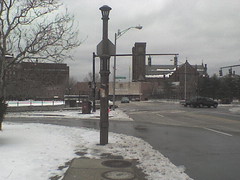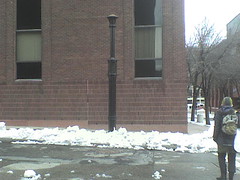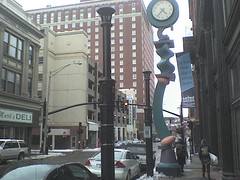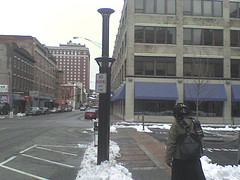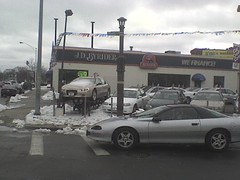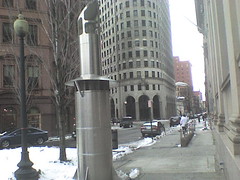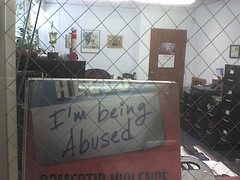1. Abandoned houses: Public? Private?
2.Public uniforms not for the public.
3.The public as place for unplanned encounter.
4.'Community spaces', libraries, prerevitalization downtown Providence.
5. The Eagle: "The Empire Never Ended"
1. On our way to Kennedy Plaza to ask people just what the "public" is, we walked from Eagle Square downtown. Our second stop was an abandoned house, with the door open. We entered to observe what evedences of usage there was in this unofficially open interior space. Artifacts within were predictably the detritus of life that is swept away in the spatial public of the city.
Clothes, beverage containers, drug paraphenalia, and turds. One room in the house had a layered wallpaper-turd toilet system. Turds were covered by successive layers of wallpaper stripped from the wall. Turds have a very private connotation in the modern public, even in an abandoned house there are efforts to further enfold, privatize them...
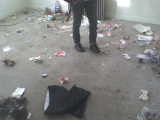 house with open door for public hidey activity
house with open door for public hidey activity
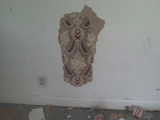 visit from psychadelic wallpaper ghost
visit from psychadelic wallpaper ghost
Visit from psychadelic wallpaper ghost
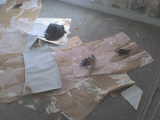 wallpaper layering toilet
wallpaper layering toilet
Wallpaper layering toilet
2. Continuing along down to Broadway we stopped at a uniform store that specialized in gear for public employees, primarily postal workers and police officers. It was clear that these were not available for public consumption and we politely replied that we could not be helped and went back out on the street.
3. Being outside in the zone of motion between here and there, the aspect of public as meeting ground was proven to us by a string of aquaintances and then meeting some friends on their way to get coughy. In this encounter was proven the further aspect of "public meeting" as a place to initiate communication and make new actions out of the intersecting motions of initially discreet entities. From the public street we went to a public extablishement and hijacked our pals outing with our discourse about the public. This detour furnished us with some interesting perspectives on the history of 'community spaces', Providence street life, and libraries.
4. The conversation got going with a bit of talk about where do we feel public and where do we feel private, and the appropriation or creation of semi-private "parochial" spaces by groups of folks. A friend visiting from out of town described their experience with a 'Community Space' that was conceived and established by members of a certain community, expressing the interest of serving the entire community (the public). This seems to have been largely unsuccessful, and the giant space with shows, a women's diy health clinic, art studios, etc. was patronized mostly by people who already knew each other, and the broader public rarely felt comfortable enough to enter.
Another friend commented that outreach is a necessary and difficult activity to disrupt this undesired domination of a 'free' space by a certain group. They also described a historical vision of downtown Providence in the recent pre-revitalization past as very active with street life; cruising, trashcan fires, drug deals, all kinds of socioeconomic relationships being played out on the public streets. But this was seen as exclusionary, and not safe or desirable for many other groups of people. The mechanism for controlling this was not outreach, but "cleaning up downtown".
They also had worked at the Providence Public Library. From our research and thoughts, it seems that public libraries are the freest of interior Public (run by the government) spaces. We were told that only about "one person per month" had to be escorted out of the library, and that in general people could be there all day and do whatever insidey behaviors they wished (one of the most troubesome being the perrenial overdosing in the locked bathroom).
And then we went on our sperate ways, the public encounter that led to a new, unplanned set of actions and communications gave way to the intitial mission of asking people just what the public is.
5. One of the people asked what public is down at Kennedy Plaza went into a lengthy diatribe about "the Eagle"; problems of imperialism and racism, that we are still living in Alexander the Great times and the Public is not safe for black folks. While talking to him, he got a call on his mobile phone, and I asked some other people what public is. Then the guy got off the phone and struck up a conversation with the two other guys who had I just spoken with. I kept on asking more folks as the three fellas talked for awhile and exchanged phone numbers.
I mentally patted myself on the back for facilitating a meeting.

